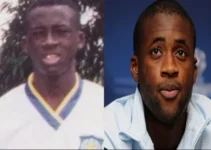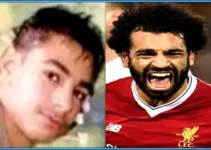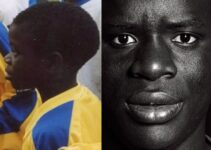Sometimes, when Sadio Mane reflects on his journey, one particular memory from his past lingers vividly—a moment that serves as a reminder of just how far he has come. Growing up with an undeniable passion for football, Mané once faced a humiliating experience that could have shattered his dreams. He recalls a time when he showed up for a football trial only to be mocked for his torn boots and shabby clothes.
A coach, shocked by Mané’s appearance, asked disdainfully, “Are you here for the football test?” When Mané answered yes, the coach berated him, sneering, “With those torn boots? And you want to play football with those shorts?” His boots were old, tattered, and his shorts were just as bad. Yet, despite the discouragement, little Mané’s determination remained unshaken.

Chasing Dreams Relentlessly: Sadio Mané’s Football Story
Preamble:
Understanding the remarkable man Sadio Mané has become today is impossible without appreciating the adversity he overcame in his early years. Growing up in a poor family in Bambali, Sédhiou, Senegal, Mané’s journey was far from easy. His father, an imam, was against his dream of pursuing football.
Tragically, his father passed away when Mané was just seven years old, leaving a significant void in his life. Eight years later, at the age of 15, driven by an unwavering ambition, Mané made the bold decision to run away from his village to Dakar, where he would begin chasing his dream of becoming a professional footballer.
This biography delves into the life of Sadio Mané, the boy born to Guinean parents who found inspiration in Senegal’s remarkable performance during the 2002 FIFA World Cup. Alongside his friends, he organized village tournaments, driven by a desire to be the best and win every game. This deep-seated determination sparked during his childhood, fueled his rise to stardom.
In this story, we explore Mané’s humble beginnings, the hurdles he faced, and how his resolve and passion for football led to his fame and success. From his early struggles to his eventual rise to becoming one of the world’s most celebrated footballers, this is the journey of Sadio Mané—proof that no dream is too distant, no obstacle too great.
Sadio Mane’s Childhood Story – Early Life and Family Background:
For biography starters, Sadio Mané was born on April 10, 1992, in Sédhiou, Senegal. He grew up in the small village of Bambali, located in the deep south of Senegal, a community of just over 24,000 people—far removed from the bustling city of Liverpool, where he would later make his name in football.
Raised in a family with many children and limited financial means, Mané lived with his uncle, as his parents could not afford to provide for all their children. Reflecting on those early years, Mané once said, “My parents never had enough money to send me to school. Every morning and evening, I would always play football in the streets with my friends.”
From a young age, Mané dreamed of the Premier League. “When I was young, I only thought about the Premier League, which I watched on TV. It was a big dream for me,” he recalled. At just 15, he began to grasp the extent of his progress, evolving from a street player with raw talent into a footballer with vision and ambition.
He fondly remembers his early days, saying, “Since I was two or three years old, I remember always being with a ball. I would see kids playing on the street and would join them. That’s how I started—on the roads. When I got older, I would go watch games, especially when the national team played. I wanted to see my heroes and imagine myself as them.”
Mané’s journey from a small village in Senegal to becoming one of the world’s top footballers is a testament to his determination and passion. His humble beginnings shaped his character and fueled his drive, making his story all the more remarkable.
Mane’s Biggest Childhood Inspiration:
Sadio Mané’s greatest inspiration to pursue a football career came during the unforgettable excitement of the 2002 FIFA World Cup. It was Senegal’s first appearance in the prestigious tournament, and the country’s stunning success deeply moved him. Mané, just 10 years old at the time, watched in awe as his national team reached the quarter-finals, an achievement that ignited his passion for the sport.
One moment, in particular, stayed with him—their shocking victory over defending champions France in the opening match. “It felt like a miracle,” Mané recalled. That historic win fueled his determination to one day represent his country on the world stage and helped shape his dream of becoming a footballer.
This pivotal moment from his childhood played a significant role in his journey, inspiring him to work relentlessly toward becoming the football star he is today.

From Dreams to Reality: Sadio Mane’s journey from awe-inspired child to football superstar, fueled by Senegal’s historic 2002 World Cup triumph over France.
After the 2002 World Cup:
Everything changed for Sadio Mane after the 2002 World Cup, when his country, Senegal, captured the world’s attention with their incredible performance. Inspired by Senegal’s success, Mané became one of the many young boys in his village who suddenly began to take football seriously. The tournament sparked a sense of hope and possibility, and from that moment, football became more than just a game for him—it became his passion and path to success.

According to Mane,
“After the 2002 World Cup, my friends and I started organizing our own tournaments in the village. I became more determined to be the best and win every match,” recalls Sadio Mané. His natural talent stood out, and everyone in the village would tell him he was the best. However, his family, deeply rooted in religion, envisioned a different future for him. Football wasn’t part of their plans.
But Mané’s passion for the game was undeniable. “Once they saw that in my head and heart, there was only football, I started convincing them, especially my uncle, to let me leave the village and go to a nearby town to learn more, before moving to Dakar, the capital,” he said.
Initially, his family resisted. But as they realized his dedication and that nothing else mattered to him, they rallied behind him. His uncle and parents sold all the crops from their farm to raise money for his football dreams. Mané’s talent was so inspiring that even those who barely knew him pulled together to support his pursuit of football. They gave him the best chance at following his only passion, a journey that would lead him to greatness.
Mane Continued…,
“My uncle was my biggest supporter, but he wasn’t the only one. Almost everyone in my village contributed money to help me chase my dream,” Sadio Mané shared. The collective effort of his community propelled him forward.
When Mané moved to the suburbs of Dakar, he stayed with a family he had never met before. “I gave them what little money I had and explained my motive. Even though my family knew someone who introduced me to them, they still took me in without hesitation. They cared for me and made sure I didn’t have to worry about anything except football.”
This overwhelming kindness from both his family and strangers helped Sadio focus on the one thing that mattered to him most: becoming a footballer.
Sadio Mane Biography – Being Disgraced Because He Was Poor:
Mane, upon arrival at Dakar’s suburb, made inquiries about the most popular football club in the town. He took the next day to visit them.
Sadio Mané recalls one of the most unforgettable moments of his early football journey with a mix of humor and humility. “When I arrived the next day, there were many boys being tested for the team. I’ll never forget this. It’s funny now, but back then, it wasn’t,” he begins.
An older man, who seemed unimpressed, approached him.
“He looked at me like I didn’t belong and asked, ‘Are you here for the test?’ I said yes. Then he looked down at my boots with frustration and asked, ‘With those boots? How can you play in them?’ My boots were in terrible shape—torn and old. He didn’t stop there. ‘And those shorts? You don’t even have proper football shorts,’ he continued.”
Despite the harsh comments, Mané wasn’t discouraged.
“I told him that what I had was the best I could manage, and all I wanted was a chance to show myself.”
Once he stepped onto the pitch, everything changed.
“You could see the shock on his face,” Mané recalled. “After I played, he came to me and said, ‘I’m picking you straight away. You’ll play on my team.’ That’s how I made it into the local team’s academy.”
This was the beginning of a football journey that would eventually lead Mané to greatness, overcoming obstacles with sheer determination and raw talent.
It is pertinent to note that Mane scored a total of 131 goals in 90 appearances for the local team in just two seasons.
How Football Saved Him:
As a child, Mane was far from even the top-flight Senegalese footballers. He was exceptional and lucky. This Miracle came when he was picked up by French Scouts on their mission to Senegal.
Part of their goal was to visit the nook and crannies of Dakar to fetch a selected few among the poorest and most gifted footballers.
More so, part of their goal was to alleviate themselves and their families from poverty. They were to offload the selected lads to the French League.
Upon sighting Sadio Mane, they were astonished by his skills. They had a personal adoration for the star.
Reports indicated he was the poorest and the most gifted footballer in the team. They used football to save him and his family from poverty.
Mane himself proved them right by delivering goals when he was told to first attend a two-season trial at the Senegalese football academy called ‘Generation Foot’ by the same French scouts.
His success at the club signified a turning point where his destiny started to take shape. After exceeding expectations, he was sponsored overseas.
These scouts took Mane to France and made him join the French club Metz. He started playing professional football in France at the age of 15.
This same club was known for launching the career of former Reds defender Rigobert Song, as well as Premier League stars such as Louis Saha, Papiss Cisse, Emmanuel Adebayor and Robert Pires.
Sadio Mane Bio – Early Life in France:
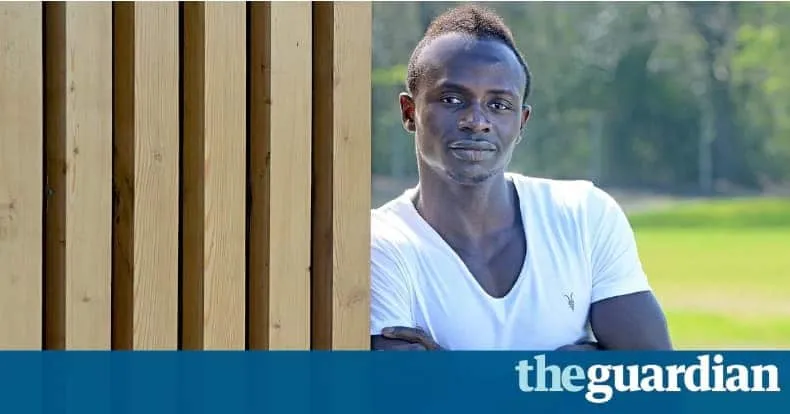
Sadio has revealed that he didn’t even tell his parents he was leaving Senegal prior to launching his career in France.
This was because his family was earlier skeptical about his dream of becoming a professional footballer. He planned to give them a big surprise. So Mane, who was 19 at the time, decided to keep his move to Metz quiet.
His mum Satou still thought he was at the Generation Foot Academy in Dakar when he called to say he was in Europe in 2011. “I only told my uncle. Even my mum, she didn’t know,” Mane said.
He Continued…
“I remember the first day I got there, to France. I was supposed to train but the coach said ‘stay at home and I didn’t have any credit on my phone card to call my mum.
The next day I went with some of my friends who were already at Metz to buy some cards. I called her and said: Hello Mama, ‘I’m in France.”
“‘Which France?’ she said. She couldn’t believe it! I said: ‘France in Europe.’ ‘What do you mean Europe? You live in Senegal.’ I said: ‘No I’m in Europe.’
She was amazed, it was baffling! Again, She was so surprised, and she’d call me every day to ask if it was true.
She still didn’t believe me until I told her to go watch me on the TV. She finally did and observed my dream had come true.”
After the initial buzz of excitement, Mane endured a tough start to life in France as a pelvic injury hampered his progress.
Getting Homesick:
Homesickness also took hold of him. The weather was tough, the culture was not the same,” he told LiverpoolFC.
“I was really missing home because it was so different to what I knew in Senegal and especially my village so it was not easy.
But I didn’t have any doubt in my head because for me to become a professional footballer was my dream so you have to work hard. To work hard, you have to make sacrifices.”
Mane went on to shine for Metz, and his performances for Senegal at the London Olympics in 2012 earned him a transfer to Red Bull Salzburg.
He scored 42 goals in 80 appearances over two seasons before his arrival on the Premier League stage.
“It was colder than France, and I didn’t speak German at first, but I had a very good coach in Roger Schmidt who helped me a lot,” he said.
“We were playing in the Europa League. Going and playing in Austria was a step forward and a very good idea. Playing for Schmidt, that was where everything started, the pressing and everything. I learned from him.”
The LFC Interview:
In an interview with LFC, Sadio Mané shared some personal insights that reveal a lot about his connection with family and his humble nature. Mané, who has no tattoos, spoke fondly about his mother’s influence on his life. After scoring what he considers the best goal of his career—against Arsenal—and following his transfer to Liverpool, the first person he called was none other than his mom.
“She was very happy,” Mané recalled. In a previous interview, he explained that his mother doesn’t watch him play football anymore. This decision came after she saw him suffer an injury during a match on TV back in their village in Senegal. “My mother never watches my football because it’s so emotional,” Mané explained. “She can’t watch football when I’m playing. She always gets afraid of someone injuring me.”
This touching revelation shows how much Mané values his family and how deeply his mother cares for his well-being, to the point where she can’t bear the stress of watching him play, despite his success.
Homes Attacked by Angry Fans:
Sadio Mane’s home once fell under attack by angry fans after he missed a vital penalty at his country’s Nations Cup match.
After Sadio Mané missed a crucial penalty in the Africa Cup of Nations, Senegal was knocked out of the tournament in the quarter-finals against Cameroon. The £34 million winger faced harsh criticism, with the fallout even extending to his family. His house in Malika, a neighbourhood near Dakar, became a target for frustrated fans. In response to the situation, his relatives were forced to flee the home for their safety.
This episode reveals not just the intense pressure and expectations placed on Mané but also the emotional toll his football career has taken on both him and his family. Despite this setback, Mané’s resilience and continued success have proven his strength of character, showing that even in moments of public disappointment, he remains one of Africa’s most beloved football icons.
They wouldn’t just forgive him even after crying after the miss and also apologizing to his country’s people.
Despite attacking his house, Thugs also threatened his relatives again at his uncle’s mansion house and trashed a £26,000 SUV that Mane bought for him.
A source said: “They turned their fury on the car and completely trashed it”. It wasn’t long before soldiers and policemen started giving Mane’s family full 24-hour protection.
His Mentor:

They both shared happy and sad moments together. According to Mane, “In my head, I knew I was coming to a team that wanted me, to a manager who knew me well and has taken me like his son”.

Sadio Mane’s love and respect for Jurgen Klopp can only be summed up in the picture below. Please don’t mind his boxer.
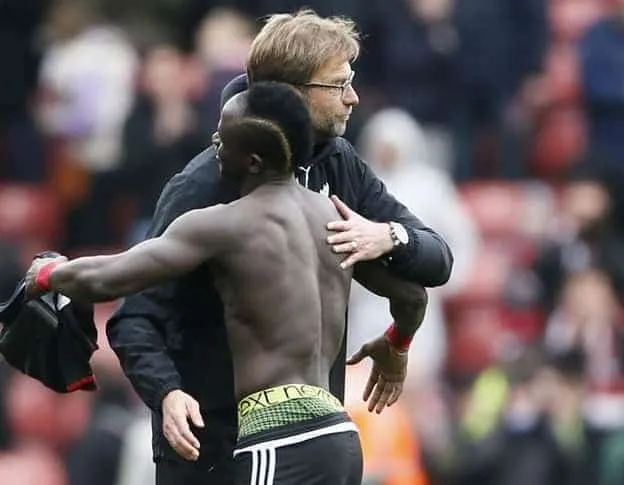
Premier League Record:
Mane holds the record for the fastest Premier League hat trick, scoring all three in just 176 seconds against Aston Villa. It’s a record for the fastest hat-trick in Premier League history.

That remarkably speedy treble eclipsed the record of four minutes, 33 seconds held by Reds legend Robbie Fowler. As I conclude this Bio, Mane has set a good example for the likes of Nicolas Jackson and Bamba Dieng, who hope to emulate his work with the Lions of Teranga.
The issue with Southampton’s Manager got him Transferred to Liverpool:
The sole reason is his frequent late arrival at the training ground and even on match days while he was at Southampton.
It’s what many have referred to as “African Time”. This was the reason for the rift with Ronald Koeman. This behaviour stopped when he joined Liverpool.
Sadio Mane Religion:
Mane, like Aliou Cisse, is a devout Muslim. He mentioned that he comes from a religious family in Senegal, and so he has been asked how often they went to church when he was a child. ‘I am Muslim,’ he says, still laughing, ‘I don’t go to church.’
The Showcase Master:
Mane is popular at Liverpool’s Melwood training ground. He is friends with everyone and is known for being humble and self-effacing. If some Premier League footballers give the impression they have been consumed by celebrity lives, Mane does not fit the stereotype. But there is one thing. He loves to advertise himself on things like what you see below.

Sadio Mane Facts – The Trio:
“Many, many, many people I grew up with, such skilful players, didn’t have the chance I did to become a professional.
I knew the things that were hard were important for me to succeed. Now I am here, with no regrets, living my dream and being friends with a duo in the name of Coutinho and Fermino.”
Mane who has an apartment in Liverpool’s city centre and no longer needs a GPS to direct him to the homes of his two best friends.
Fact Check and Appreciation Note:
Please contact us (via comment) if you notice anything that appears wrong in Sadio Mane’s Bio. Don’t forget to stay tuned for more related Segenalese Football Stories. The Life story of Habib Diallo and Boulaye Dia would interest you.
We appreciate you for taking the time to read Sadio Mane’s Biography. Our writers strive for accuracy and fairness in the quest to deliver you the History of African Football Players.
